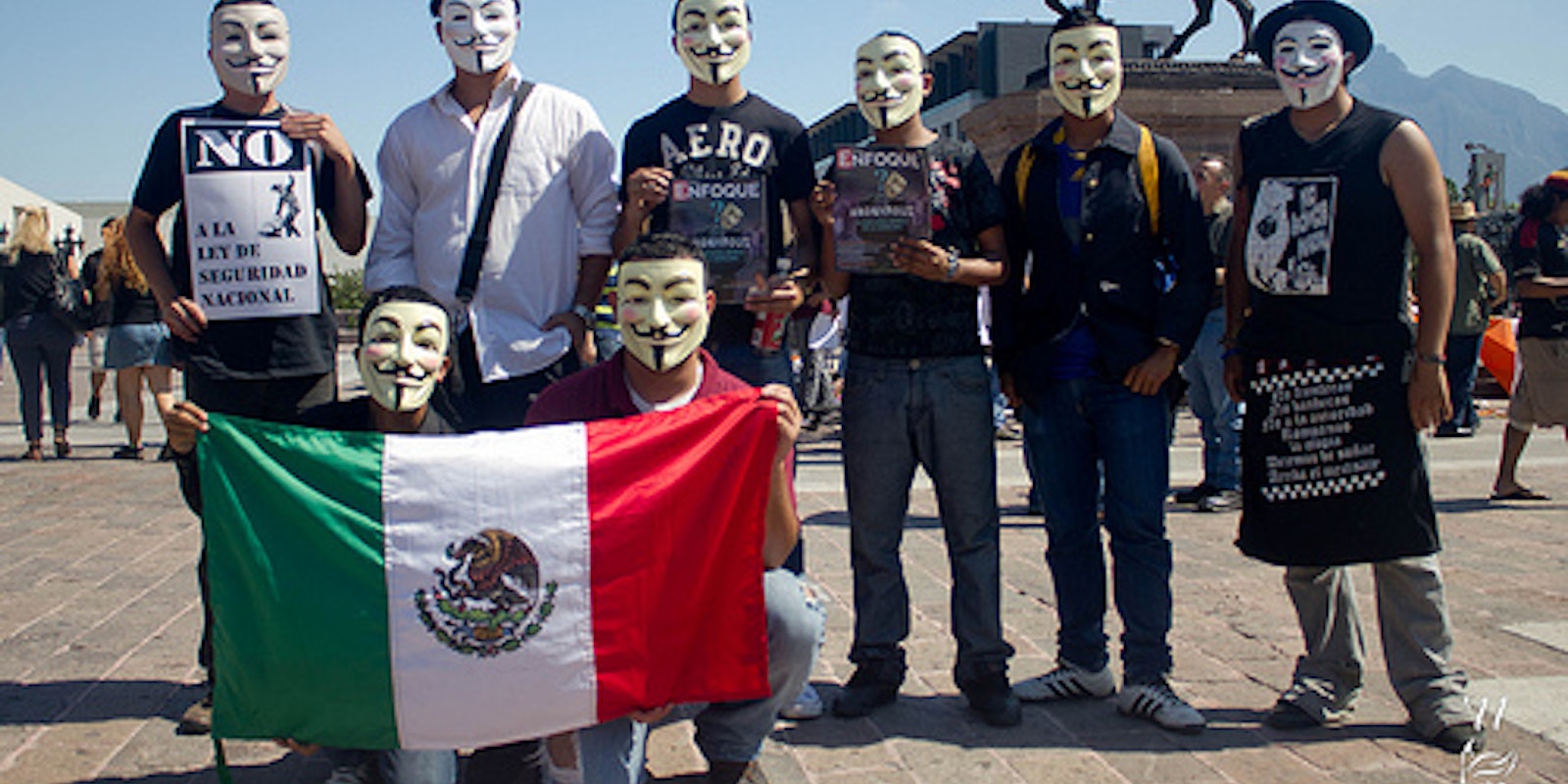In the end, Anonymous blinked.
After a week of posturing and infighting, Anonymous called off #OpCartel, its bold plan to go toe-to-toe with the violent, Los Zetas drug cartel in Mexico. Anonymous claimed its member that had been kidnapped last month in Veracruz had been released ahead of today’s deadline.
But there were also indications that safety concerns forced the group—composed of activists and hackers—to call off the plan.
“[The freed Anonymous member] has sent us a message,” a Friday post, on Anonymous Iberoamerica, a Spanish-language Anonymous blog read. “If Anonymous unveils any name related to the cartel, the family of the kidnapped Anonymous member will suffer the consequences. For each cartel name revealed, 10 people will be put to death.”
Anonymous had said if the member—who remains unidentified—had not been released it would begin publicizing the names of politicians, police officers, journalists, and others who work with Los Zetas. The passing of Nov. 5 without incident capped off a week in which Anonymous debated internally whether they should risk the safety of its members by going forward with #OpCartel and was hit with allegations that the kidnapping itself may have been a hoax.
The one clear-cut winner of Saturday’s non-action in Mexico seems to be Barrett Brown, a 30-year-old from Dallas who emerged this week labeled as a spokesman for Anonymous Mexico. Brown was making claims Saturday that he had secured a six-figure deal from Amazon to co-author an insider’s account of Anonymous.
“So @BarrettBrownLOL is making six figures from a previous enemy of #Anonymous and he is going to endanger lives in #OpCartel? Not cool,” @the_infecti0n posted on Twitter.
On Friday and Saturday, Brown was vowing on Twitter that he would continue to investigate officials’ ties to other drug cartels, and those investigations would target all of the cartels, not just Los Zetas. That vow came even as Anonymous tried to promote the information that the release of cartel members’ names would result in more bloodshed.
“We now have a group of cartel experts, citizens on the ground, journalists, and others assisting in #OpCartel as we go after otre [sic] cartels,” Brown tweeted Friday night. Early on Friday, Brown claimed he had sent 25,000 Mexican government emails to the German news magazine Der Spiegel for review and that he was assisting CNN on a story linking a U.S. District Attorney to the cartels.
Security experts question whether or not the cartels were backing down because of the Anonymous threats.
“These guys, the cartels—they’re professionals,” said Gregory Evans, a hacker-turned-security consultant who said he was contacted Tuesday by an intermediary of the cartels asking for information about Anonymous. “Anonymous is a bunch of kids; the cartels aren’t going to take them seriously.”
Evans, who has been a critic of Anonymous in the past, said Brown’s emails will not conclusively prove any government ties to the cartels because the cartels are sophisticated enough to know not to put any incriminating information in writing.
“They don’t put stuff on paper, they don’t put stuff on computers,” he said. Brown is “not saying (he) hacked into the DEA or the FBI’s computer systems and found clear-cut evidence. As far as I’m concerned, just releasing a bunch of names proves absolutely nothing.”
Even Brown himself suggested that Los Zetas didn’t know the true identity of the person who had been kidnapped until this week.
“The Anon who had been kidnapped last month by the Zetas has been released, although it appears that the Zetas concerned did not know that the individual was the Anon whose release had been demanded by those who instigated #OpCartel. As such, no bargain has been fulfilled,” Brown wrote on the Pastebin website. “Meanwhile, those who have been in possession of the e-mails have promised to provide them to me alone, which is to say that everything that proceeds from now on is my own work, and not that of Anonymous. Any reprisals against anyone other than myself, then, will have no effect.


